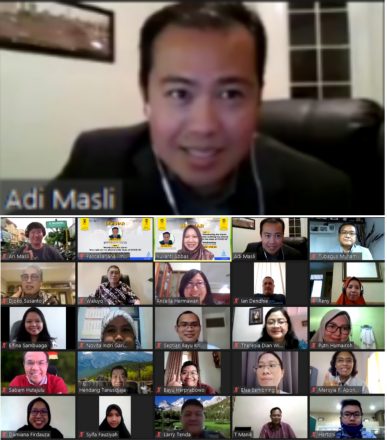PPIA FEB UI Workshop: Anticipating Storms of Changes in Audit during Covid-19
Nino Eka Putra ~ PR of FEB UI
DEPOK – (19/8/2020) The Postgraduate Program in Accounting, Faculty of Economics and Business, Universitas Indonesia (FEB UI) held a virtual workshop, entitled “Weathering the Storm: How Auditing has Altered in the Wake of Covid-19”, on Wednesday (19/8/2020).
The speakers at this workshop were Adi Masli, Ph.D., Associate Professor and Koch Foundation Fellow of The University of Kansas School of Business, USA, moderated by Yulianti Abbas, Ph.D., Chair of the PPIA FEB UI Study Program and opened by Dr. Ancella A. Hermawan, Chair of the Accounting Department of FEB UI.
Adi Masli, as a resource person, conveyed that the development of Covid-19 and the existence of travel restrictions around the world, together with the need to conduct audits in accordance with regulations / laws, have created challenges to internal audit efforts to find other alternatives to replace the traditional audit process, which was initially a face-to-face process, became a remote audit process. Strategies for dealing with each part of the audit engagement process are carried out remotely or online, including planning, document checking, fieldwork, interviews, and closing meetings.

Referring to the ASC 275 Financial Accounting Standards Board (FASB), this standard requires companies to have disclosures that focus on risks and uncertainties that could significantly affect the amounts reported in financial statements in the near future. However, companies face challenges in using estimates to form financial statements and are vulnerable to negative conditions, due to the current uncertainty that exposes companies to risks and losses in the near future.
In addition, professional auditing standards require the auditor to evaluate whether or not there is substantial doubt about the client’s ability to continue as a going concern. “In other words, the auditor needs to warn that the client will not survive one year after the auditor signs the audit opinion. For example, auditing the inventory, the client may not be able to do a physical inventory count at the end of the year, because of the Covid-19 situation and the audit team may not be able to attend in person. “Adi Masli added.
Based on discussions with the head of the public accounting firm, on August 6, 2020 PricewaterhouseCoopers (PwC), assisted clients by providing authorization services and writing comfort letters. PwC has invested in digital technology to help companies. Audit costs have remained stable and the audit committee has asked for a fee cut. The auditor will do more work by trying harder and going with a lot of risk. This makes auditors who are in more senior positions more productive.
On the one hand, other public accounting firms, such as Ernst & Young (EY) are already using artificial intelligence for lease accounting. Lease accounting document analyzes are traditionally performed using human reviews. Artificial intelligence tools will make it possible to review about 70% – 80% of the contents of a simple lease electronically and the rest for human consideration.
“Basically, it is necessary to analyze the Fraud Triangle to describe the three stages of conditions that cause fraud in a company’s financial statements, namely pressure, opportunity, and rationalization (justification) . The three stages of the fraud triangle are interrelated. This means that a worker will not have the opportunity if he does not receive encouragement or pressure to cheat. ” Adi Masli closed his presentation session. (hjtp)
(am)





